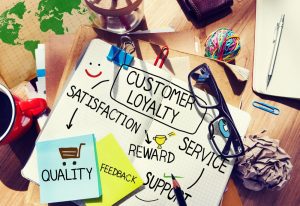0
You have 0 items in your cart

Building a brand that can thrive in the current market is extremely different from building a brand 40 years ago. Working heavily on how you portray your brand to world simply won’t cut it. Now, it’s a two-way street. It involves keeping in touch with customer perception both on the streets and online, but most importantly, the taking care of your business culture internally. Why? Because your culture affects every single decision you make, it attracts and retains both employees and customers. Give meaning to your business.
The brand and culture of a company reflect each other in an interconnected system. While a brand can be defined as the outward manifestation of a company’s DNA, the culture is where your brand is born.The culture goes further to actually determine whether a brand is perceived well by both employees and customers. Your culture influences management decisions and all business functions ranging from production, advertising to accounting.

The culture of a business affects employees who interact with customers directly. By creating a great culture, a company is guaranteed that employees will be in a position to respond to customer goals and develop awareness on how to portray a great company image through shared values.

Satisfied employees are the direct result of a strong culture and are a significant determinant of whether a business will succeed or not. Its employees are a business most important asset. Great company culture leads to a high energy and motivated team who are willing to offer great services because they love and believe in the business.

A well-designed business culture ensures that the staff is fully equipped in providing all customers with interpersonal sensibility and social account. That is because they deeply understand the business and connect to it, guiding their actions by the company values established. According to Forbes, the quality of interpersonal treatment provided by employees during a negotiation or exchange has a huge impact on the level of customer satisfaction.
The business culture and the brand show the public intrinsically that your company is authentic and committed to customer satisfaction — and its employees and the world around them. A strong company culture helps in an employee create a sense of belonging, when it provides a great working environment where they have an easy time working hard, meeting targets, relating to customers and — developing themselves professionally and personally.
 Your employees may have direct contact with your customers, online or offline, playing a significant role in brand perception. The culture of a company determines how your employees will interact with customers and third parties, directly impacting on the kind of image your business portrays to the general public.
Your employees may have direct contact with your customers, online or offline, playing a significant role in brand perception. The culture of a company determines how your employees will interact with customers and third parties, directly impacting on the kind of image your business portrays to the general public.
Relating to the customer as an employee is using your culture to create a good brand image. By relating to your customer as an employee you will make them relate to your brand on a deeper level, leaving no reason for them to support your competition. You are giving an insider sneak-peek of your company to your customer and business partners. They get a real sense of what your company is about: not only your product or your service but your company values and beliefs that give it a meaning for existence. You give your business a purpose people can relate to and your business becomes a brand everyone involved can proudly advocate for. How do you achieve that? Start by understanding your values and crafting mission and vision that guide your business.

Since your company’s internal culture has a powerful influence on how your brand is perceived, it is extremely important to brand your culture. If you get the culture right, other stuff such as exceptional customer services, creating a valuable long-term relationship and having passionate employees, partners, and customers will happen effortlessly. In reality, your brand and culture are really just two sides of the same coin. You have to shape your company culture because that is the foundation for your brand. And once you have a defined culture, you should proudly shout it out from the mountain tops!
What does your company stand for? Who are you? For your brand to survive and thrive in the current business world, your culture has to ensure that employees see themselves as part of the brand promise that your company is trying to market. Branding your culture creates consistency, authenticity and ensures the longevity of a brand. When employees, partners, and customers have the same understanding of the kind of ideas a brand embodies, it makes a brand endlessly powerful.

Define your brand by reviewing the service or product that your company offers. Pinpoint the exact space or gap in the market that your brand occupies and research the emotive and rational needs, concerns and requirements of all your customers. By defining your brand through your culture, you create a brand character that connects with your customer base and makes you unique and different in the market.

Ascertain what your core values are and ensure they are echoed in your culture. When the core values of a brand are established, it then becomes quite easy to shape the culture so that it can reflect upon the brand. The core values chosen should be in accordance with the business strategy and the culture should be modeled to embody these values.

Your brand should also visually be in tune with your culture. The forefront of the visual representation you use should tell the story of why your company matters, what it does, all taking the market it appeals to into consideration.

When building your brand, think of it as a whole person with values, beliefs, and purposes. Demonstrating who you are helps you connect with the customer base you are targeting. By demonstrating who you are, you are essentially creating an authentic image that will help build trust with consumers. After demonstrating who you are, ensure that you communicate to your target market with a consistent voice.
What you must keep in mind is that the culture of a business deeply influences all aspects of the business, but especially your employees. That’s why when crafting and implementing your culture, you should involve your staff in the process. Your employees are the most important asset of your business.
A Brand is a living entity — and it is enriched or undermined cumulatively over time, the product of thousand small gestures.
The culture of a business is essentially the style or model of business operation within a company. Your culture will determine the way employees deal with customers and clients. Employees are indispensable resources in creating a great brand; they are in a position to make hundreds of decisions on their own every day. Keep in mind that the culture is their blueprint/guide. Culture is all about the personnel and ensuring they have a productive and fun working environment.
 No matter the kind of product or service you deal with: your employees are a powerful representation of your brand. They interact directly with your client. We have all dealt with a customer service representative; how we perceive them can either build or break consumer loyalty. Although customers were once considered the lifeline of a brand; customer loyalty has become more valuable particularly in age ruled and influenced by social media. The culture will determine the conduct of customer care representative making employees an important resource in creating a great brand identity.
No matter the kind of product or service you deal with: your employees are a powerful representation of your brand. They interact directly with your client. We have all dealt with a customer service representative; how we perceive them can either build or break consumer loyalty. Although customers were once considered the lifeline of a brand; customer loyalty has become more valuable particularly in age ruled and influenced by social media. The culture will determine the conduct of customer care representative making employees an important resource in creating a great brand identity.
Now, here are some actions to take to ensure your employees are contributing to building a desired business image.

Treat employees respectfully. Strive for a democratic business culture that is inclusive instead of patronising — a condescending culture isolates everyone. A democratic and inclusive business culture will create a work environment that has a sense of camaraderie and that feeling will extend to the customers and partners.

Make your employees feel valued. How do you do that? By listening to their opinion — this will make them feel like they are part of the brand. If your employees are loyal to your brand they will easily promote it and recommend it to customers. An engaged and motivated staff will proudly share the vision and mission of the company.

Aim at an organizational culture that bonds. Brands that make all employees feel part of a community excel at customer appeal and brand awareness. When employees start viewing each other as a tight-knit community they work harder and are more committed to making the brand a success.

Consistently offer advanced training to your employees. Support the desire of an employee to improve by giving them the opportunity to go to workshops, attend seminars, and further develop their skills. They will not only improve their performance at work but also feel happier and fulfilled.
 Your staff is your brand! Essentially, your employees are your brand in action. Although employees can break or make your brand, numerous entrepreneurs underestimate the value of a great culture. What does this mean? For your brand to survive and thrive particularly in a competitive market your employees need to embody the brand identity. By embodying your brand, the employees are becoming your most reliable brand ambassadors — for it to happen, the culture has to be in complete alignment with the business strategy as a whole. Here are ways an employee can embody your brand identity;
Your staff is your brand! Essentially, your employees are your brand in action. Although employees can break or make your brand, numerous entrepreneurs underestimate the value of a great culture. What does this mean? For your brand to survive and thrive particularly in a competitive market your employees need to embody the brand identity. By embodying your brand, the employees are becoming your most reliable brand ambassadors — for it to happen, the culture has to be in complete alignment with the business strategy as a whole. Here are ways an employee can embody your brand identity;

Employees should conduct themselves in alignment with the vision, purpose, values and beliefs of a business. The core values of a business will support the vision of a business and help shape the culture. Establishing strong core values is a great way to ensure all employees live up to the vision, purpose, and beliefs that define your business.

Your staff is live representation of your brand. How they talk to customers, how they respond to consumer complaints and concerns will have a lasting impact on a customer. The same goes to any other party your business gets involved with. Once your employees become your brand in action, your culture quits being a mere poster on the wall — will become a real part of your brand identity.

The mission of a company can either be utterly useless or a total goldmine! A mission statement conveys what the company hopes to achieve and the image it intends to portray to the public. Here are 3 indispensable characteristics of a good Mission Statement:
A good mission statement is aimed at creating a central direction and the only way it can achieve this is by being specific and carrying a strong purpose. The mission statement gives central direction by offering insight into what company leaders and all employees view as the primary purpose of establishing the business.
This means that it should resonate with employees and express the organization’s goals in such a way that inspires support from everyone that work there. An effective mission statement should inspire and encourage the staff to think and go beyond their job descriptions and assigned roles.
The mission statement, as it can easily be accessed by the public, should explain in words to all potential business partners, clients, and customers what your brand represents.
 1. Openness and transparency gives your brand an appealing personality
1. Openness and transparency gives your brand an appealing personalityThe market is crowded with unscrupulous entrepreneurs. The best way to create a likeable company personality is being completely open and transparent. Creating an authentic personality will make customers trust and believe in what a company offers, which lead to consumer loyalty.
When you take the honest and open approach in branding, you are able to easily tell your target market what you are about. Your strategic decisions also become easier to make as you have your culture to guide every step of the way.
Now, that you are well acquainted with culture and branding. Here is an example of an organization that got the business culture right and is reaping massive benefits from it.

A huge organization that embraces the connection between culture and brand is the USAA-the insurance and financial-services juggernaut based in San Antonio, Texas. It is an impressive organization with slightly over 7.4 billion members, 21000 employees, and outstanding annual revenue of $18 billion. Here is how USAA interrelated branding and culture rightly to increase their profitability and customer appeal.
This successful organization has clearly defined its brand; they service only active or retired members of the US military and their families. USAA has provided its very specific customer base with tailored services and has trained its staff on how serve these customers fabulously well. The exceptional customer service has led to off-the-chart customer rankings that have transformed the USAA from a little known brand to a legendary brand, both in terms of service delivery and technological innovation.
The USAA has also succeeded in branding its culture by creating a strong sense of identification between the front line employees and the customers. The USAA does most of its business over the internet and over the phone and has over 13,000 customer representatives. This innovative company has motivated its employees by developing a much-admired training program where the personnel learn a myriad of technical skills that can increase their productivity.
They have created a unique brand that differentiates it from its competitor in the industry by being empathetic to customers’ needs. The USAA has developed a reputation for having empathetic customer representatives. They see the world through the eyes of a soldier on active duty in a dangerous war zone who needs to send money home. How does the USAA help its employees develop a sense of empathy? Simple! By making the training regimen as realistically close to a real soldiers experience as possible:
Before training employees review the real deployment letters that soldiers get…these letters have a section that reads “Report to the personnel processing-facility tomorrow and get your affairs in order beforehand” This letter serves to evoke emotions that can mimic what an actual soldier goes through.
 During several corporate training sessions, employees also eat MREs (meals ready to eat), which helps them get a hands-on taste of how a soldier truly lives on the field. These employees walk around carrying 65 pound backpacks like those of soldiers and read actual letters from soldiers to their families at home. This part of training is called ’Surround Sound’’ which is aimed at making employees understand the real life and emotional needs of their target market. You can bet that after successfully going through this impressive training regimen, an employee that truly believes in USAA values will rightly and promptly respond to customer needs, requirements and even complaints.
During several corporate training sessions, employees also eat MREs (meals ready to eat), which helps them get a hands-on taste of how a soldier truly lives on the field. These employees walk around carrying 65 pound backpacks like those of soldiers and read actual letters from soldiers to their families at home. This part of training is called ’Surround Sound’’ which is aimed at making employees understand the real life and emotional needs of their target market. You can bet that after successfully going through this impressive training regimen, an employee that truly believes in USAA values will rightly and promptly respond to customer needs, requirements and even complaints.
This kind of personal identification between customers and employees has led to an unsurpassed zeal and commitment to providing better service. It has fueled the motivation to create technological innovations that can improve customer service. Some of these inventions include USAA being the first service company to allow its customers to manage deposit checks using the iPhone. By obsessing about pleasing customers, the USAA has further developed their technology to become a leader in innovation in their field.
 Its current annual revenue stands at an impressive $18 billion which makes it a market-leader in its industry
Its current annual revenue stands at an impressive $18 billion which makes it a market-leader in its industry
USAA has revolutionized from a regional company to a widely acclaimed company that is highly regarded nationwide. Its customer base is large, loyal, and rapidly expanding.
The secret behind USAA success is simple: a company cannot have a special, compelling, distinctive, and unique brand identity unless it identifies its niche and tailors all its services to meet or even surpass expectations.
So how does your culture affect your brand? Simple! Your culture brings your brand to life!
This Privacy Policy describes how SmartMinds Enterprise OÜ (“SmartMinds”, “we”, “us” or “our”) handles information about yourself that you may provide us with through your use of the Site or Service (“Personal Information”) and should be read along with our Terms of Use posted here, and all other operating rules and additional terms and conditions published on our Site.
SmartMinds is committed to keeping your information secure and managing it in accordance with our legal responsibilities under privacy and data protection laws where we operate. SmartMinds uses your Personal Information only in accordance with this Privacy Policy and Applicable Law. SmartMinds does not sell your Personal Information to third parties. Any capitalized terms not defined in this Privacy Policy are defined in the Terms of Use.
We employ the use of cookies. By using SmartMinds‘s website you consent to the use of cookies in accordance with SmartMinds’s privacy policy.
Most of the modern day interactive web sites use cookies to enable us to retrieve user details for each visit. Cookies are used in some areas of our site to enable the functionality of this area and ease of use for those people visiting. Some of our affiliate / advertising partners may also use cookies.
Unless otherwise stated, SmartMinds and/or it’s licensors own the intellectual property rights for all material on SmartMinds All intellectual property rights are reserved. You may view and/or print pages from https://smartminds.stagings.one for your own personal use subject to restrictions set in these terms and conditions.
You must not:
We will approve link requests from these organisations if we determine that: (a) the link would not reflect unfavourably on us or our accredited businesses (for example, trade associations or other organisations representing inherently suspect types of business, such as work-at-home opportunities, shall not be allowed to link); (b)the organisation does not have an unsatisfactory record with us; (c) the benefit to us from the visibility associated with the hyperlink outweighs the absence of SmartMinds; and (d) where the link is in the context of general resource information or is otherwise consistent with editorial content in a newsletter or similar product furthering the mission of the organisation.
These organisations may link to our home page, to publications or to other Web site information so long as the link: (a) is not in any way misleading; (b) does not falsely imply sponsorship, endorsement or approval of the linking party and its products or services; and (c) fits within the context of the linking party’s site.
If you are among the organizations listed in paragraph 2 above and are interested in linking to our website, you must notify us by sending an e-mail to Please include your name, your organisation name, contact information (such as a phone number and/or e-mail address) as well as the URL of your site, a list of any URLs from which you intend to link to our Web site, and a list of the URL(s) on our site to which you would like to link. Allow 2-3 weeks for a response.
Approved organizations may hyperlink to our Web site as follows:
No use of (name)’s logo or other artwork will be allowed for linking absent a trademark license agreement.
Without prior approval and express written permission, you may not create frames around our Web pages or use other techniques that alter in any way the visual presentation or appearance of our Web site.
We shall have no responsibility or liability for any content appearing on your Web site. You agree to indemnify and defend us against all claims arising out of or based upon your Website. No link(s) may appear on any page on your Web site or within any context containing content or materials that may be interpreted as libelous, obscene or criminal, or which infringes, otherwise violates, or advocates the infringement or other violation of, any third party rights.
We reserve the right at any time and in its sole discretion to request that you remove all links or any particular link to our Web site. You agree to immediately remove all links to our Web site upon such request. We also reserve the right to amend these terms and conditions and its linking policy at any time. By continuing to link to our Web site, you agree to be bound to and abide by these linking terms and conditions.
If you find any link on our Web site or any linked web site objectionable for any reason, you may contact us about this. We will consider requests to remove links but will have no obligation to do so or to respond directly to you.
Whilst we endeavour to ensure that the information on this website is correct, we do not warrant its completeness or accuracy; nor do we commit to ensuring that the website remains available or that the material on the website is kept up to date.
We have a 30-day Money Back Guarantee when purchasing Realized Mind, all we ask if that within the 30 days to complete the learning experience and if you truly feel you did not receive any value from the experience we are happy to refund your payment and close your account.
To the maximum extent permitted by applicable law, we exclude all representations, warranties and conditions relating to our website and the use of this website (including, without limitation, any warranties implied by law in respect of satisfactory quality, fitness for purpose and/or the use of reasonable care and skill). Nothing in this disclaimer will:
The limitations and exclusions of liability set out in this Section and elsewhere in this disclaimer: (a) are subject to the preceding paragraph; and (b) govern all liabilities arising under the disclaimer or in relation to the subject matter of this disclaimer, including liabilities arising in contract, in tort (including negligence) and for breach of statutory duty.
To the extent that the website and the information and services on the website are provided free of charge, we will not be liable for any loss or damage of any nature.
